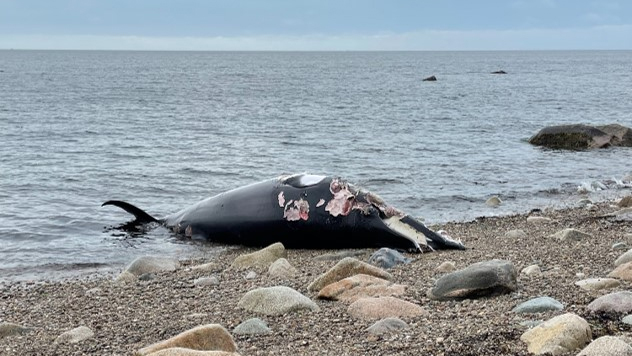Stranded minke whale stinks so bad it's like 'death in a dumpster'
There have been an unusually high number of minke whale strandings since 2017.
Get the world’s most fascinating discoveries delivered straight to your inbox.
You are now subscribed
Your newsletter sign-up was successful
Want to add more newsletters?

Delivered Daily
Daily Newsletter
Sign up for the latest discoveries, groundbreaking research and fascinating breakthroughs that impact you and the wider world direct to your inbox.

Once a week
Life's Little Mysteries
Feed your curiosity with an exclusive mystery every week, solved with science and delivered direct to your inbox before it's seen anywhere else.

Once a week
How It Works
Sign up to our free science & technology newsletter for your weekly fix of fascinating articles, quick quizzes, amazing images, and more

Delivered daily
Space.com Newsletter
Breaking space news, the latest updates on rocket launches, skywatching events and more!

Once a month
Watch This Space
Sign up to our monthly entertainment newsletter to keep up with all our coverage of the latest sci-fi and space movies, tv shows, games and books.

Once a week
Night Sky This Week
Discover this week's must-see night sky events, moon phases, and stunning astrophotos. Sign up for our skywatching newsletter and explore the universe with us!
Join the club
Get full access to premium articles, exclusive features and a growing list of member rewards.
An extremely stinky minke whale that washed ashore in Plymouth, Massachusetts, will now be carted off to a landfill.
One local said the stench was so bad it was "like death in a dumpster," according to news reports.
The dead whale was first spotted July 17, bobbing 1.4 miles (2.3 kilometers) offshore of Manomet Point, according to a Facebook post by the National Oceanic and Atmospheric Administration (NOAA) Fisheries Northeast/Mid-Atlantic office. It was already deceased. The next day, the carcass washed ashore on a private beach.
The International Fund for Animal Welfare examined the whale but was not able to conduct an autopsy (called a necropsy in animals) because there was no disposal plan for the body, according to NOAA. The group did determine that the minke whale (Balaenoptera acutorostrata) was a 21-foot-long (6.4 meters) male.
The cause of death is unknown, but the stranding is part of an unusual mortality event for minke whales. Since 2017, this species has seen a higher-than-average rate of strandings along the East Coast from Maine to South Carolina. According to NOAA, the cause of this unusual mortality event remains a mystery: There have been 18 necropsies on stranded minke whales. Two showed indications of human interaction before their deaths; nine showed signs of fisheries interaction (such as scars from being entangled in nets or lines); and eight were suspected to have contracted an infectious disease.
There is also an ongoing unusual mortality event among humpback whales (Megaptera novaeangliae), which began in 2016 along the East Coast. However, NOAA researchers have not been able to find any common threads in the strandings between the whale species. It could take years to gather enough data to determine underlying causes, according to the agency.
NOAA Northeast/Mid-Atlantic is now working with the homeowner's association (HOA) that is responsible for the beach to plan a disposal strategy. The preferred method of dealing with a whale carcass is to let it decompose where it lies, according to the agency. A dead whale is a bonanza for scavengers, and ultimately returns the whale's nutrients back into the ecosystem. But that's not practical in this case due to the smell of the animal and its proximity to town.
Get the world’s most fascinating discoveries delivered straight to your inbox.
"I live up the hill over on the other side, and there are days when you walk outside hoping to smell sea air and all you can smell is dead whale," local resident Lynn Holdsworth told NBC Boston. "And it's like death in a dumpster. It's horrible."
As a result, the HOA is now working to get heavy equipment to haul the whale away to the nearby Bourne landfill.
Originally published on Live Science

Stephanie Pappas is a contributing writer for Live Science, covering topics ranging from geoscience to archaeology to the human brain and behavior. She was previously a senior writer for Live Science but is now a freelancer based in Denver, Colorado, and regularly contributes to Scientific American and The Monitor, the monthly magazine of the American Psychological Association. Stephanie received a bachelor's degree in psychology from the University of South Carolina and a graduate certificate in science communication from the University of California, Santa Cruz.
 Live Science Plus
Live Science Plus











